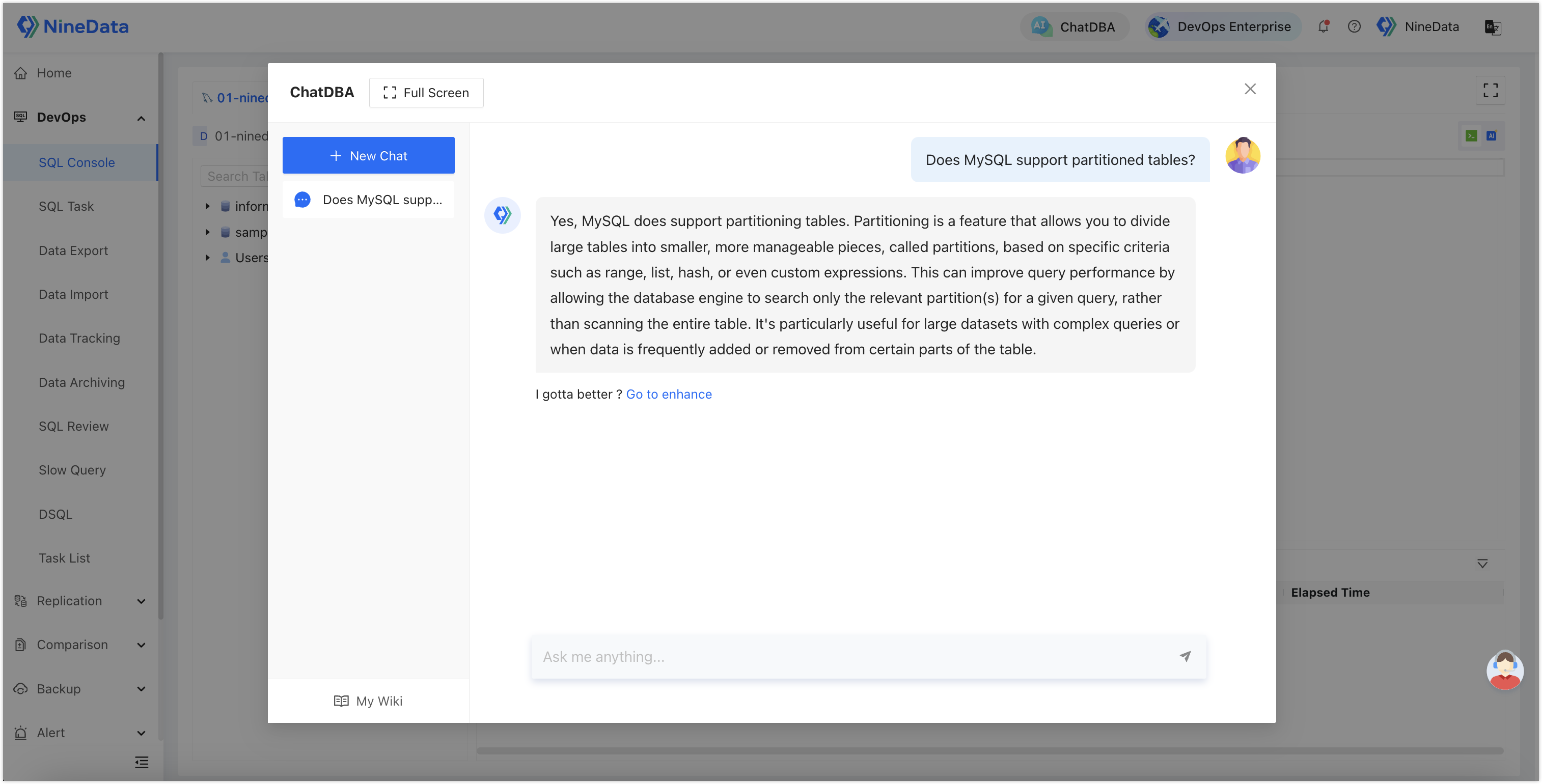NineData vs Archery
Both NineData and Archery are products in the field of Database DevOps. The core of Archery is to provide a one-stop SQL auditing capability, while NineData is a comprehensive Database DevOps platform that, in addition to SQL auditing, supports more functionalities and database types.
NineData comprehensively surpasses Archery in product features and offers a permanent free version of the Database DevOps Professional Edition with specifications for 10 data sources under the SaaS mode. Users can register and start using it without the need for application servers and database hardware, which is very convenient for small and medium-sized teams.
Features Comparison
| Category | Feature | Archery | NineData |
|---|---|---|---|
| Basic Abilities | Deployment Mode | On-premise | Cloud (SaaS), On-premise |
| Open Source | Open source, Apache V2 license, advanced features charged | Not open source, free for up to 10 database instances (Cloud mode), charged for more than 10 | |
| Supported Data Sources | 9 | 60 | |
| Cloud Platform Adaptation | Alibaba Cloud RDS MySQL | Alibaba Cloud, Tencent Cloud, Huawei Cloud, Baidu Cloud, China Mobile Cloud, AWS, GCP | |
| Login Mode | Username/password, SSO(LDAP) | Username/password, SSO(LDAP), WeChat | |
| Supported Languages | Chinese | Chinese, English | |
| Database DevOps | SQL Console | Supported | Supported |
| Object Visualization Management | ❌ | Supported for tables, views, stored procedures, functions, triggers, events | |
| Query Result Set Operations | View | View, modify, search, filter, export | |
| Session Isolation | ❌ | Supported | |
| SQL Audit and Deployment | SQL Change Release | Supported | Supported |
| Change Automatic Backup | Supported | Supported | |
| Approval Process | Supported | Supported | |
| OnlineDDL | Supported | Supported | |
| OnlineDML | ❌ | Supported | |
| Built-in SQL Specifications | 100+ | 100+ | |
| Mobile Approval | ❌ | Supported | |
| Release Process Orchestration | ❌ | Supported | |
| Data Security | Sensitive Data Protection | Supported but not rigorous, easily bypassed | Supported |
| Permission Authorization Mode | Administrator authorization, user-initiated application | Administrator authorization, user-initiated application | |
| Permission Model | Users, roles, data sources, groups | Users, roles, data sources, environment groups | |
| Operation Audit | Supported | Supported | |
| Advanced Data Processing | Data Import | ❌ | Supported |
| Data Export | ❌ | Supported | |
| Data Archiving | Supported for MySQL (using pt-archiver plugin) | Supported | |
| Data Tracking | Supported for MySQL (using binlog2sql plugin) | Supported for MySQL | |
| Database Union Query | ❌ | Supported | |
| Performance Diagnosis | Slow SQL Performance Analysis | Supported | Supported |
| Session Management | Supported for MySQL | Supported | |
| Others | AI Big Model Integration | ❌ | Supported, providing Text2SQL, AI SQL diagnosis, ChatDBA |
Difference Detail 1: Product Installation and Deployment Mode
NineData: Default recommendation is the Cloud (SaaS) mode, where users can register an account on the official website and start using it immediately. For enterprises with higher data compliance requirements, NineData also provides on-premise deployment mode (requires preparation of application servers and database servers).
Archery: Open-source product, only available for local installation and deployment mode (requires preparation of application servers and database servers).
Difference Detail 2: Open Source and Free
- NineData: Code is not open source. The Cloud platform provides a permanent free version of the Professional Edition with support for up to 10 data sources. More than 10 data sources require payment.
- Archery: Open source, licensed under Apache.
Difference Detail 3: Supported Database Types
- NineData: Supports more than 60 types of databases including MySQL, Oracle, PostgreSQL, SQLServer, MongoDB, Dameng, OceanBase, PolarDB, AWS Aurora, ClickHouse, and Doris.
- Archery: Supports MySQL, PostgreSQL, Oracle, SQL Server, Redis, MongoDB, ClickHouse, Cassandra, and ODPS.
Difference Detail 4: Cloud Platform Support
- NineData: Supports mainstream cloud platforms such as Alibaba Cloud, Huawei Cloud, Tencent Cloud, Baidu Cloud, China Mobile Cloud, AWS, etc. It supports private network connections via VPC and automatically obtains cloud database information through cloud platform APIs, eliminating the need for manual entry by users.
- Archery: Supports Alibaba Cloud RDS.
Difference Detail 5: SQL Console
The SQL editing window is the core function for developers to operate databases, similar to database client functions, both products support it.
NineData: Provides an experience similar to Navicat and DBeaver, supporting complete object navigation and various visual operations for tables, views, stored procedures, etc. Smart SQL editing prompts are more accurate and efficient, and the result set supports richer operations such as editing, copying, searching, sorting, and exporting. After using NineData, enterprises can avoid the hassle of installing various database client tools.
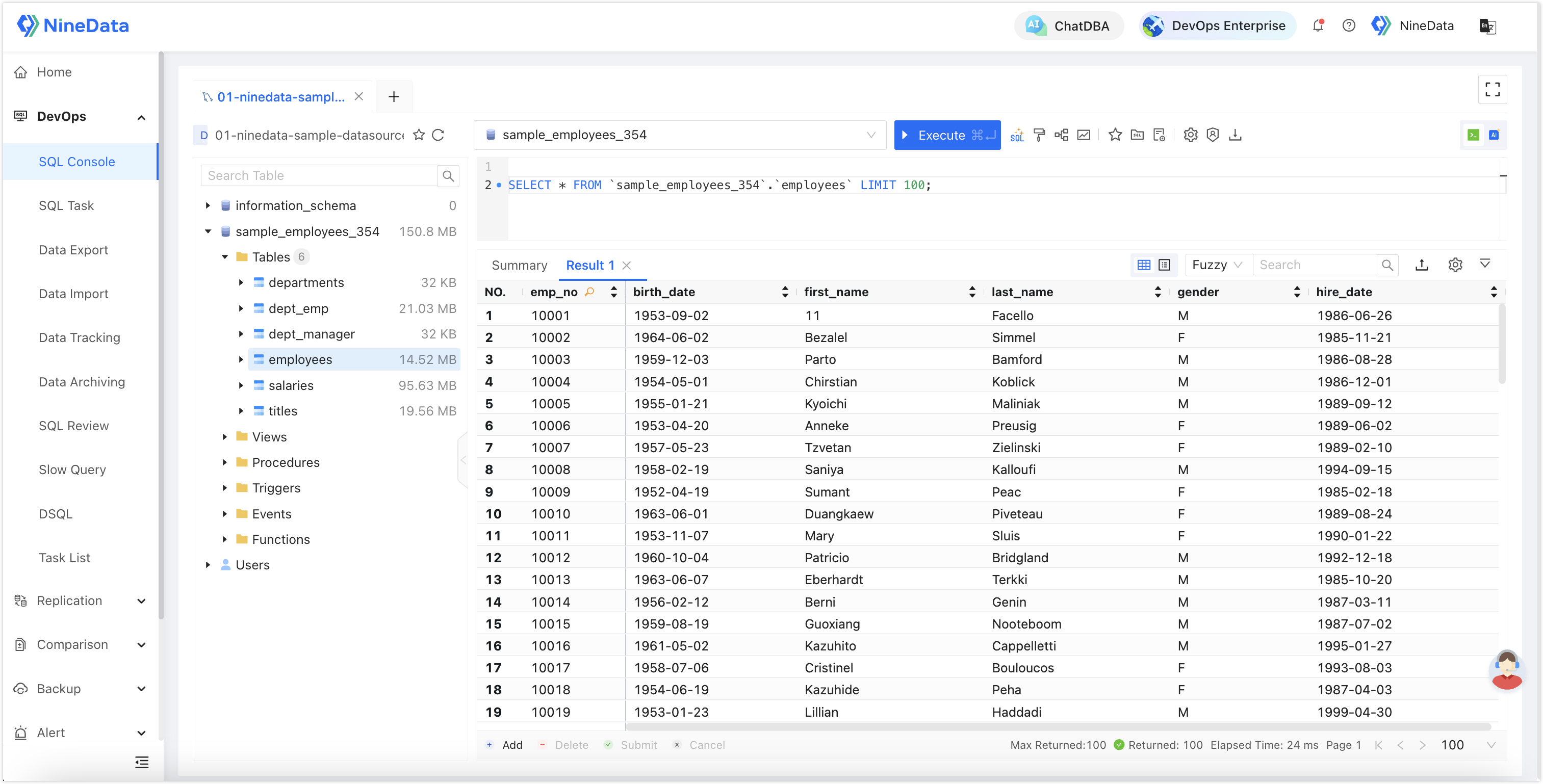
Archery: Provides basic capabilities for SQL editing, code prompting, and query result display.
Difference Detail 6: SQL Audit and Deployment
The main function of Archery, including standard SQL task submission, review, execution, and change data backup functions, MySQL databases support OnlineDDL.
In comparison to Archery, NineData has the following advantages:
- OnlineDML: Valuable for large-scale data corrections because large-scale database corrections may affect business and require DBAs to convert them into batch executions. NineData provides built-in automated OnlineDML capabilities to improve operational efficiency and database stability.
- SQL Task Pause: During the execution of SQL tasks, users can manually pause them.
Difference Detail 7: SQL Development Specifications
SQL development specifications are an important part of enterprise database development standards, such as primary keys, field types, field naming conventions, etc., traditional client tools do not provide such functions, and they are one of the core capabilities of database DevOps products.
- NineData: Supports over 100 audit specifications.
- Archery: Supports over 100 audit specifications.
Difference Detail 8: Sensitive Data Protection
Databases typically store business-sensitive data such as customer phone numbers and bank card numbers. Traditional client tools do not provide sensitive data desensitization protection, which can easily lead to sensitive data leakage. NineData and Archery both provide data desensitization capabilities.
NineData: Provides very rigorous sensitive data protection and identification capabilities. Various complex SQL statements can be automatically desensitized and protected.
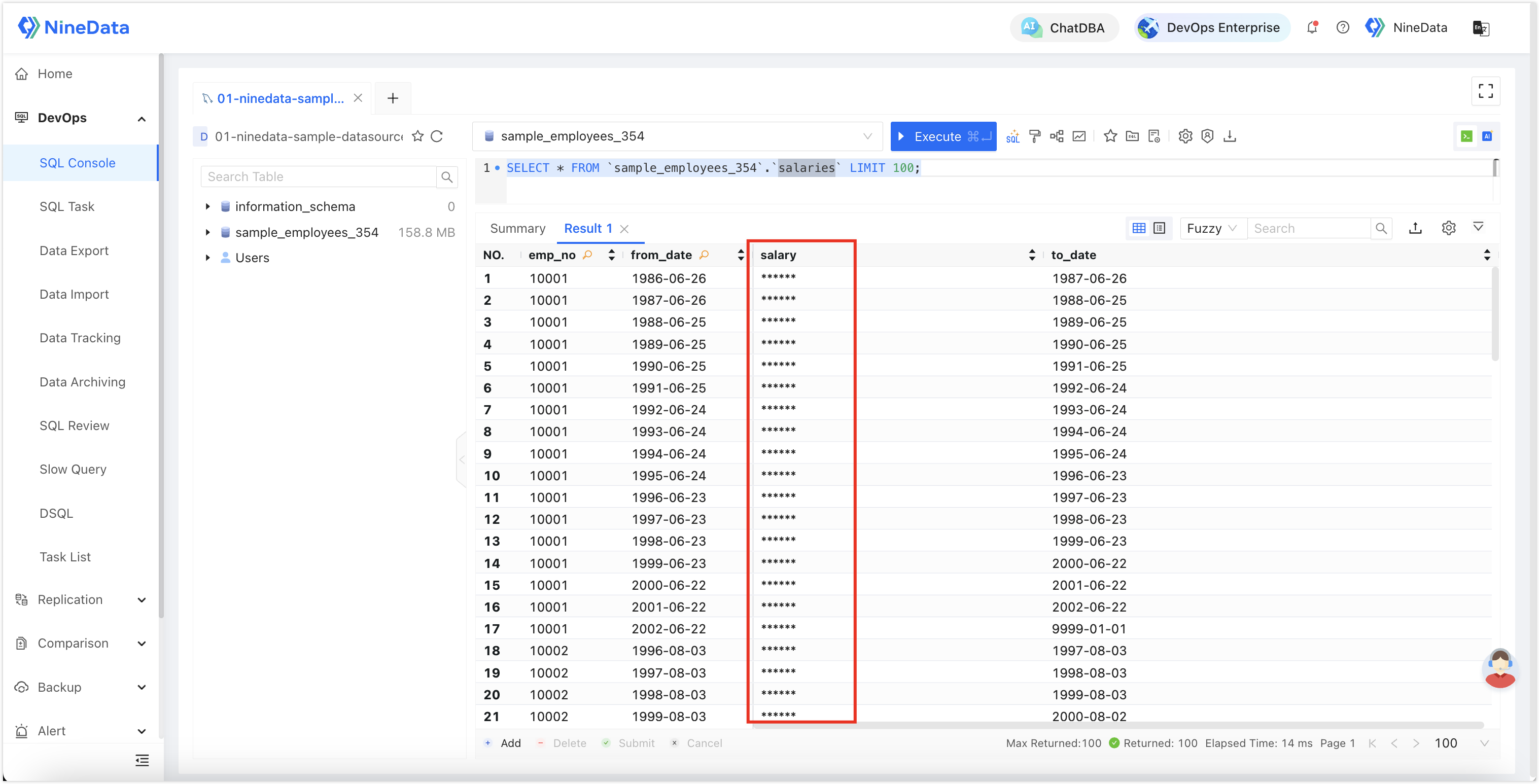
Archery: Although it has sensitive data field configuration capabilities, it can be easily bypassed with simple SQL statements, rendering it ineffective. It should not be used in production environments.
Difference Detail 9: Permission Acceptance Mode
Both NineData and Archery provide the capability for administrators to grant permissions in the backend and for users to actively apply for permissions.
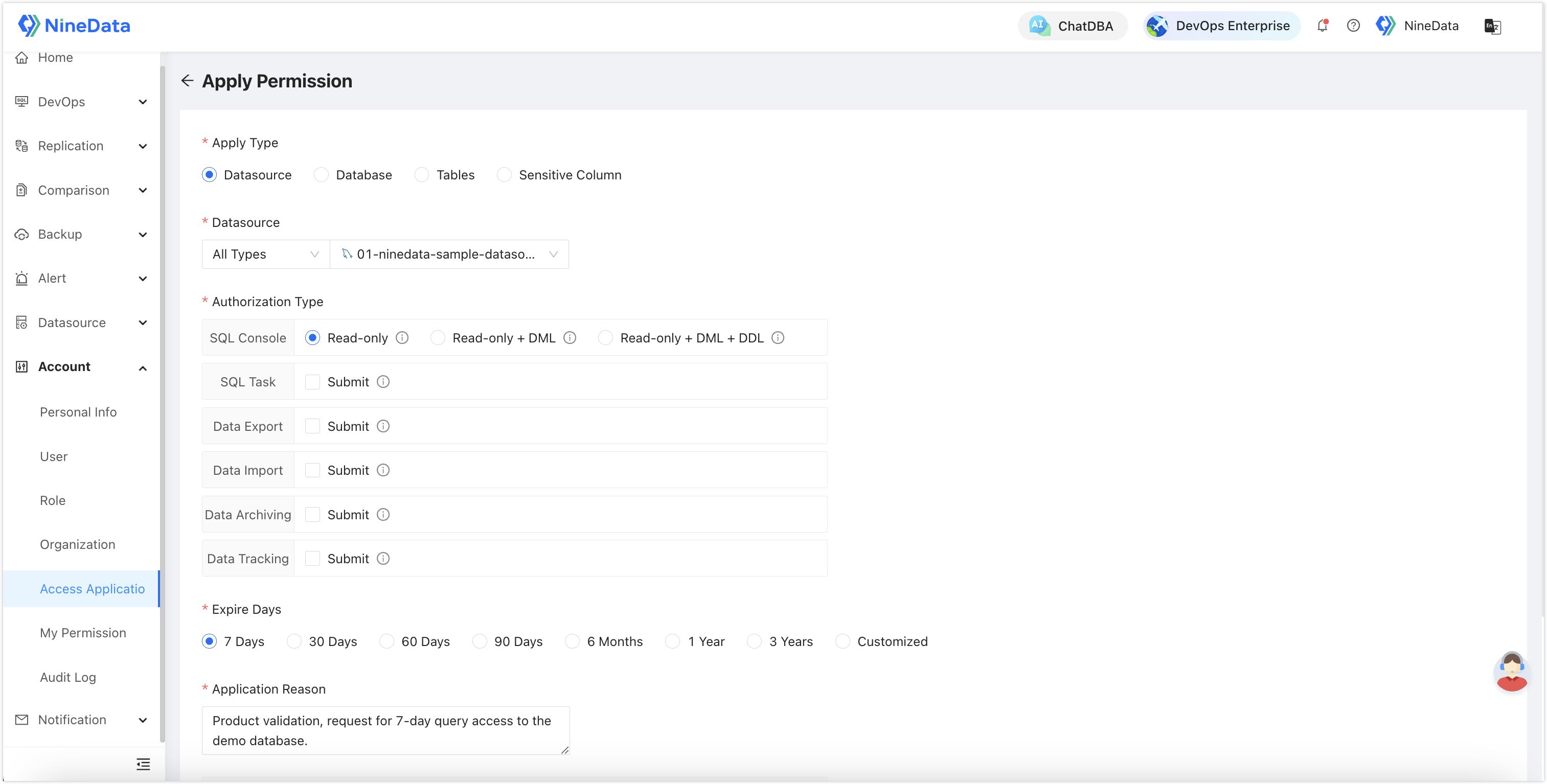
Difference Detail 10: Multi-Language Support
- NineData: Chinese, English.
- Archery: Chinese.
Advanced Features Supported by NineData but Not Archery
Data Import: Suitable for importing large amounts of data into databases. Each file supports up to 5 GB and supports SQL scripts or CSV file formats.
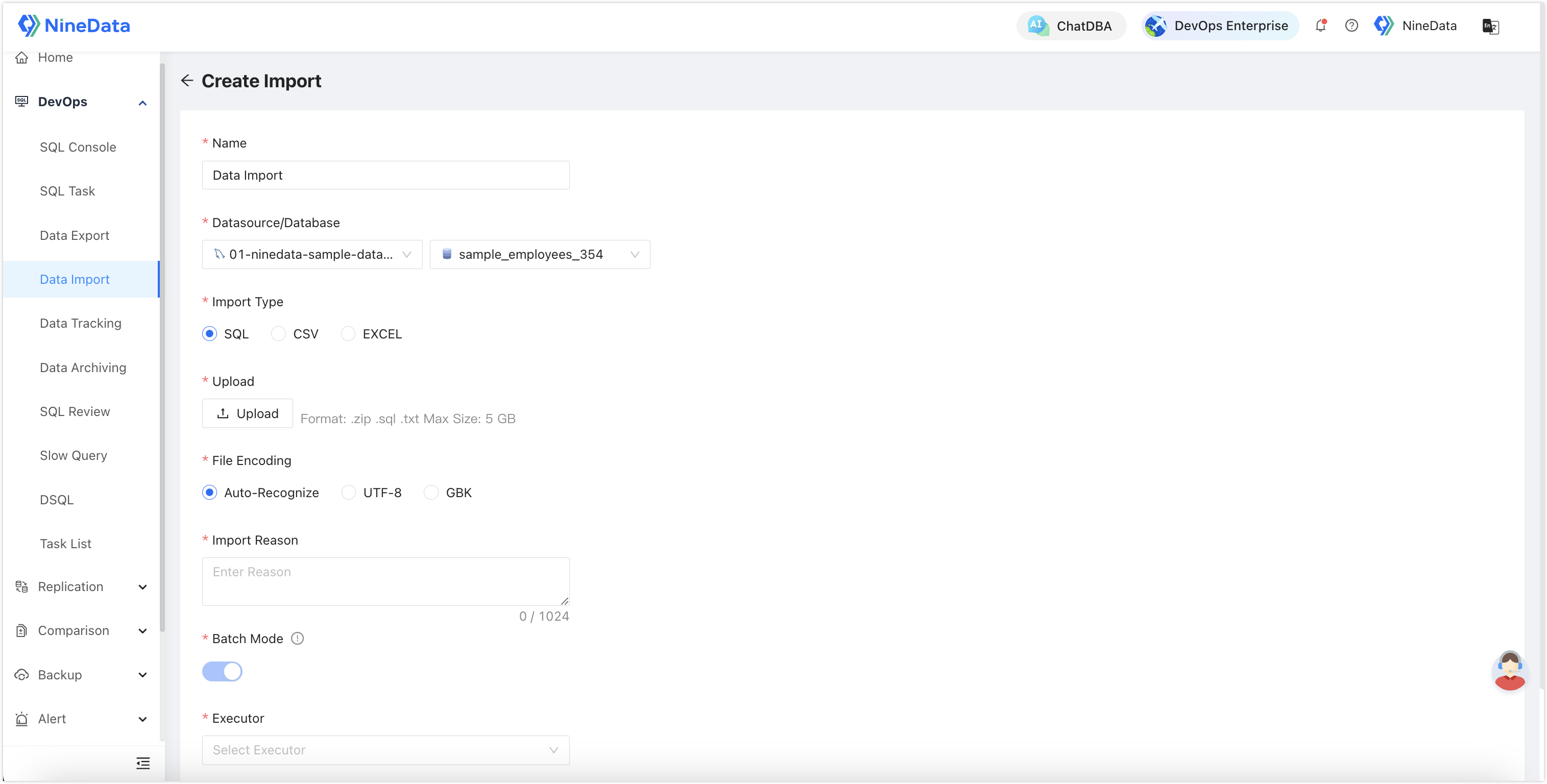
Data Export: Suitable for quickly exporting data, supports automatic data export desensitization, and allows selection of entire databases, multiple tables, or export via SQL statements.
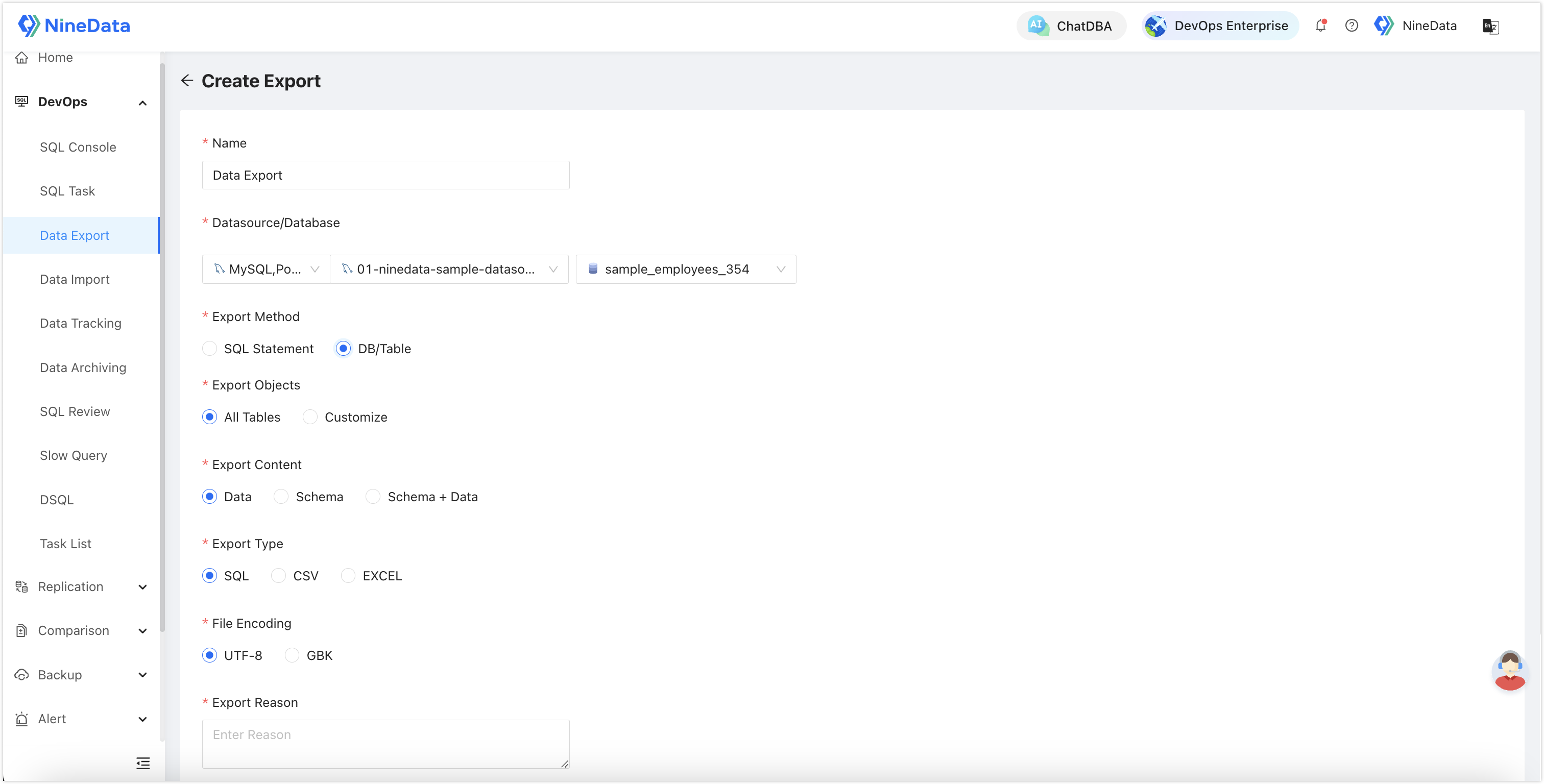
Data Archiving: Suitable for archiving and cleaning historical data, with configurable cleaning rules and scheduled execution.
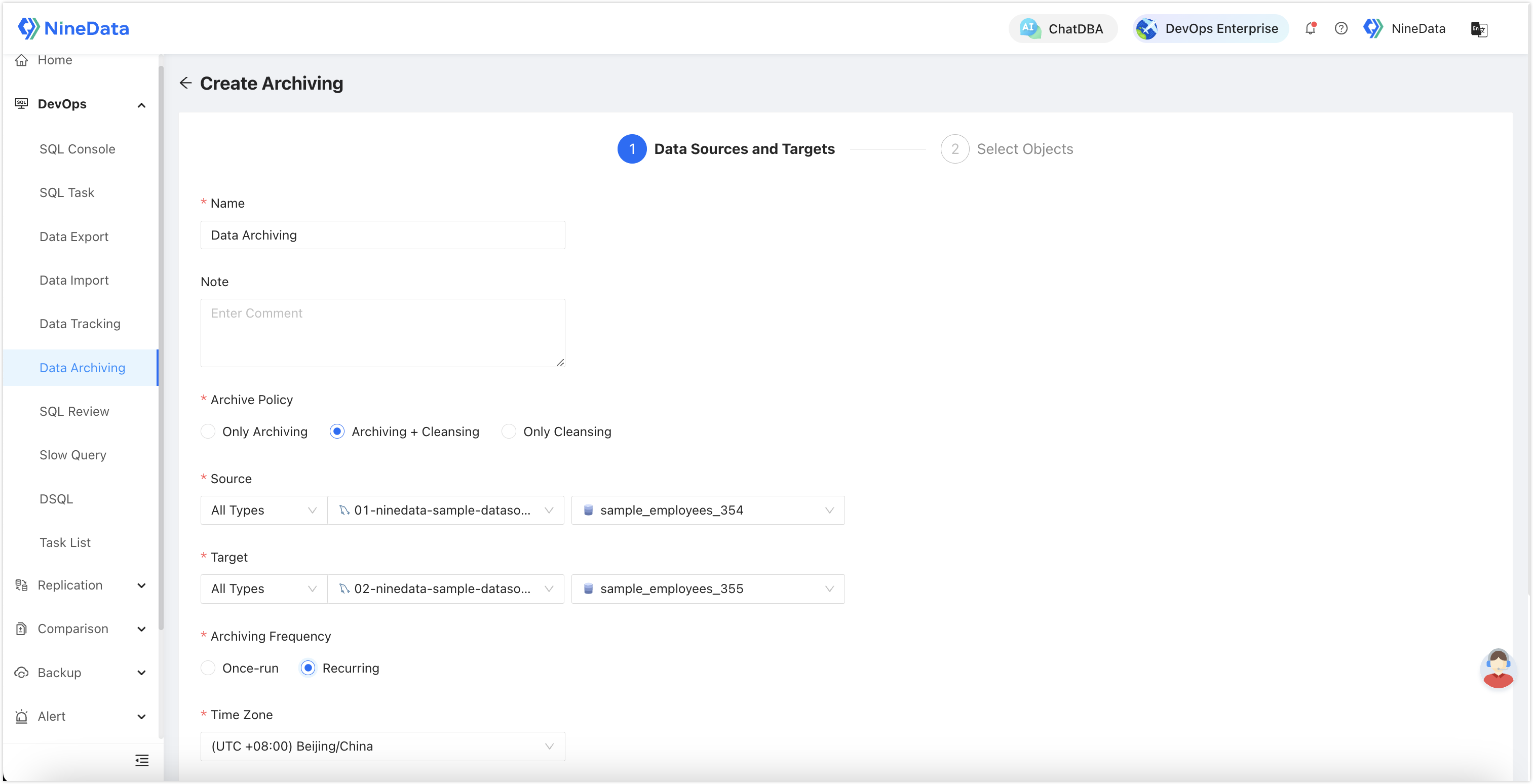
Data Tracking: Supports querying historical data change tracking, suitable for quickly rolling back operations after mistakes. Currently supports MySQL databases.
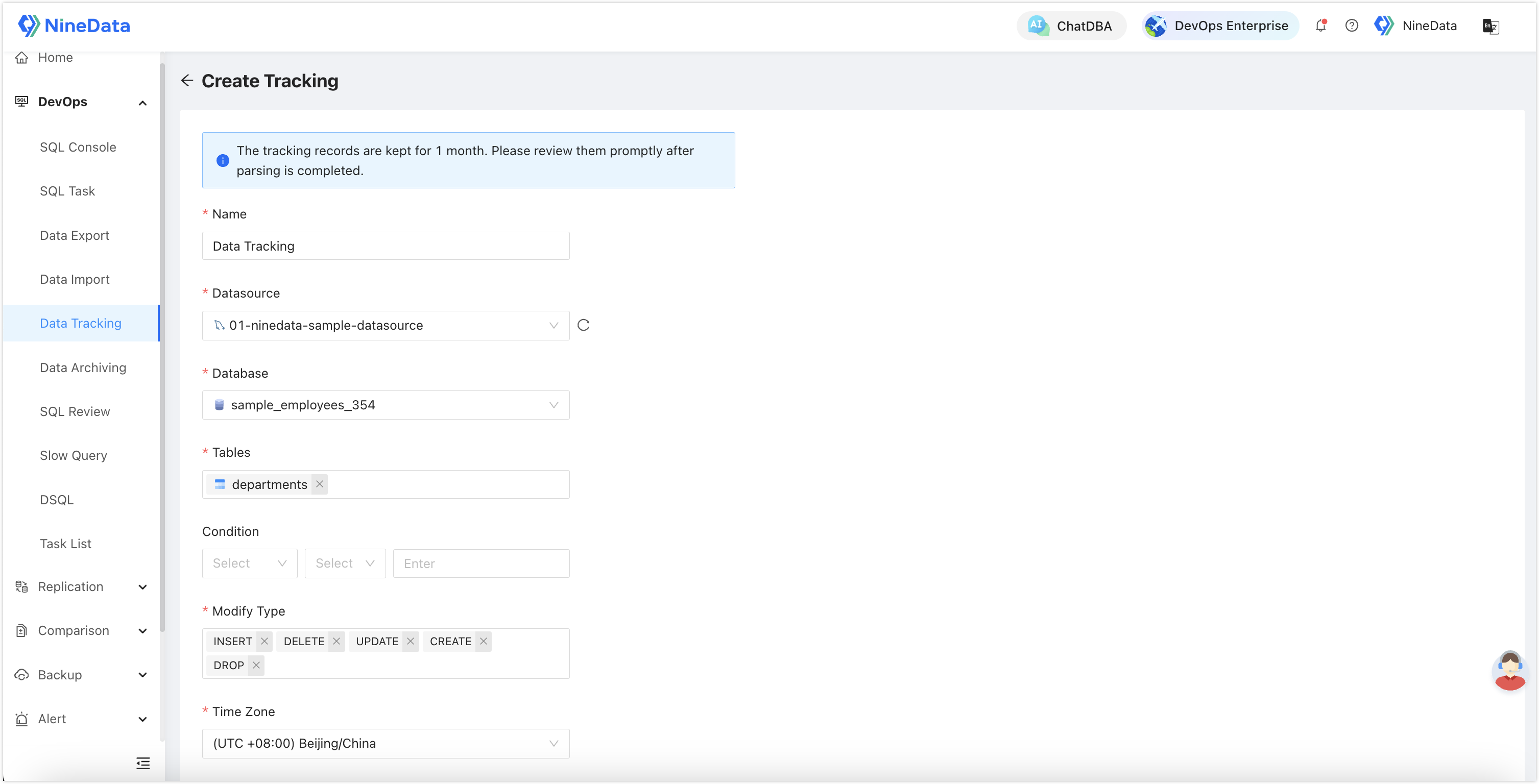
Session Management: Supports real-time query of database session status, killing sessions, and statistics grouping by client, login user, and session status.
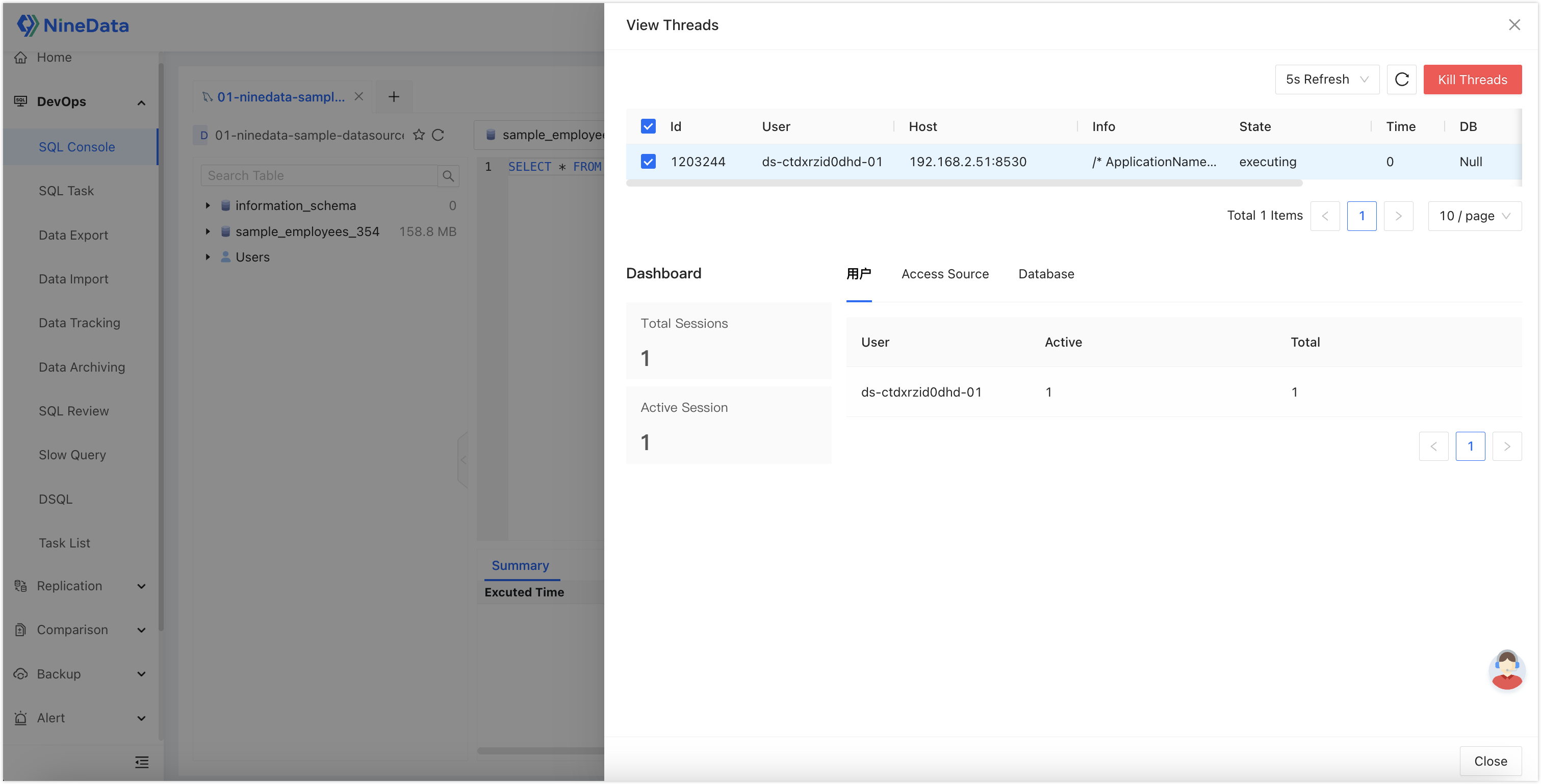
Slow SQL Management: Supports automatic collection, analysis, and diagnosis of historical SQL executions in databases.
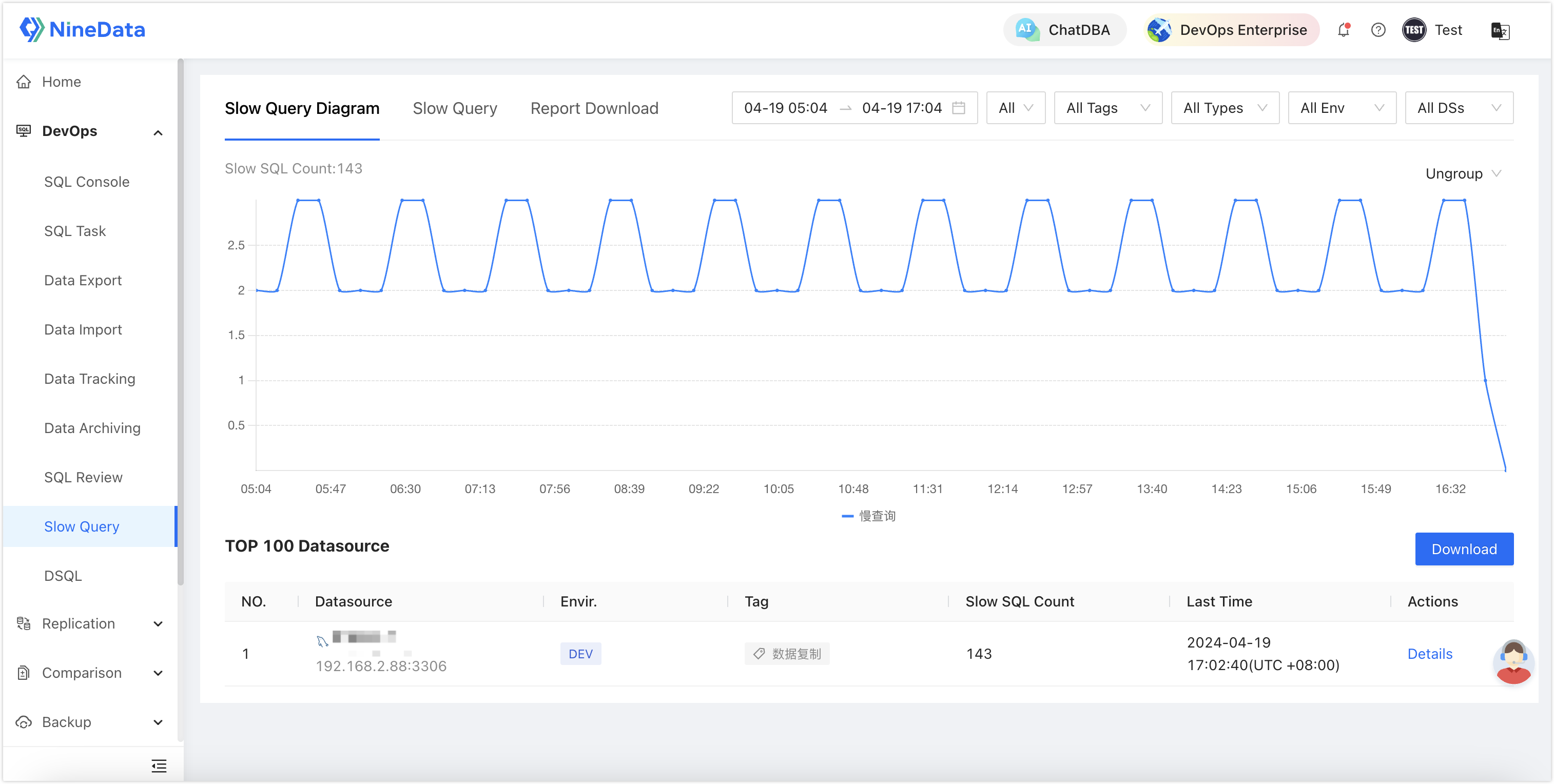
Development Process Orchestration: Provides database CI/CD capabilities, supporting enterprises to configure database release processes for development, testing, production, and other environments.

AI Big Model Integration: Based on large model AI technology, it provides innovative capabilities such as natural language generation of SQL, intelligent SQL optimization, and ChatDBA.
